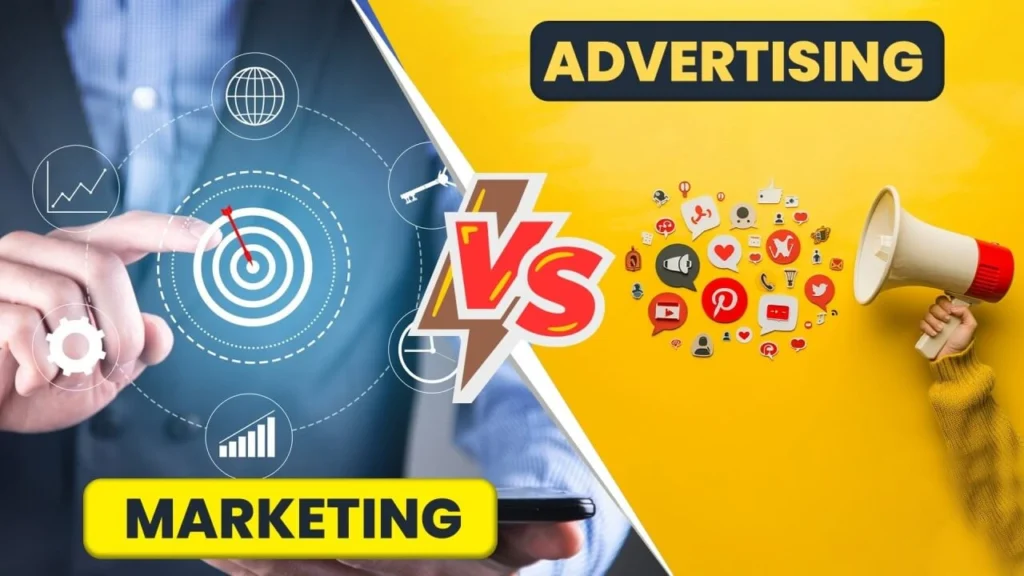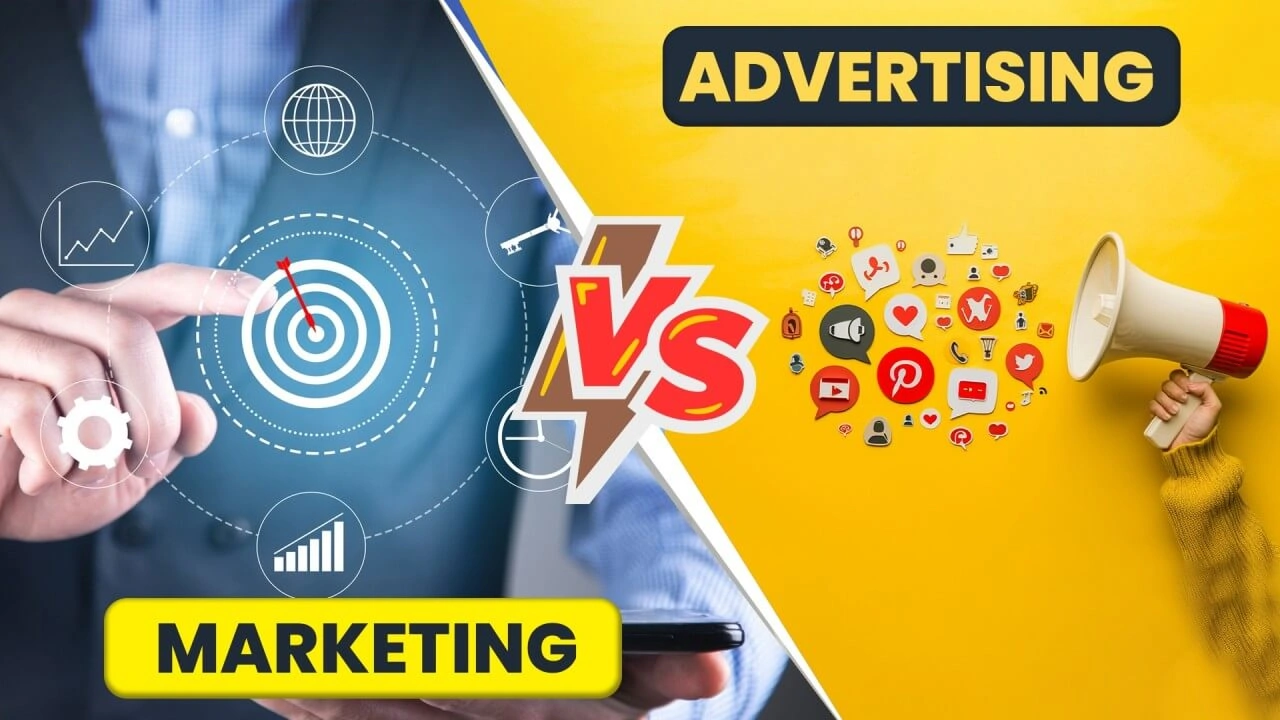Marketing and advertising are often mistakenly used interchangeably, but they are distinct concepts. Marketing encompasses a wide array of strategies designed to create long-term brand awareness and customer loyalty, while advertising focuses primarily on promoting products or services through paid methods to drive immediate actions. Understanding these differences is vital for businesses aiming to craft comprehensive, successful strategies.
The distinction between marketing vs advertising is crucial as businesses navigate the complex digital landscape. Digital marketing vs traditional marketing has become a common debate, with the rise of internet-based strategies replacing traditional methods. By understanding these key differences, companies can create tailored campaigns that achieve both long-term growth and immediate conversions.

Content
What is Marketing? A Comprehensive Strategy for Long-Term Growth
Marketing is a broad, ongoing effort to attract, engage, and retain customers over time. It involves various strategies designed to build brand awareness, foster relationships, and generate a steady flow of sales. Key components of marketing include content marketing, SEO, social media marketing, and email marketing.
For instance, content marketing focuses on creating valuable, relevant content to attract and engage the target audience. SEO (Search Engine Optimization) enhances a website’s visibility on search engines, driving organic traffic and promoting brand recognition. Social media marketing uses platforms like Instagram and Facebook to interact directly with potential customers, while email marketing keeps existing customers engaged through personalized communication.
Unlike advertising, which aims for short-term results, marketing looks to create lasting relationships and long-term brand growth. Successful examples include Apple’s consistent brand-building efforts through product launches and customer engagement, or Coca-Cola’s campaigns that focus on emotional connections and brand loyalty over the years.
What is Advertising? A Targeted Approach for Immediate Impact
In contrast to marketing, advertising is a paid, direct approach aimed at driving immediate results, such as clicks, conversions, or product sales. Advertising focuses on paid promotional methods, including PPC (pay-per-click) ads, display ads, and traditional formats like TV commercials or radio advertisements.
For example, PPC allows businesses to target specific keywords and pay for clicks on their ads, while display ads show visual content on websites and apps, prompting users to take action. TV and radio ads, on the other hand, are typically used for mass awareness, though they may have less precision in targeting specific groups compared to digital methods.
Unlike marketing, which builds a brand over time, advertising is designed for short-term gains. For instance, an online store may launch a PPC campaign to promote a limited-time sale, driving immediate traffic to their site and boosting sales for that period.
Comparing Marketing and Advertising: What Sets Them Apart?
While marketing vs advertising often gets blurred, understanding their distinctions is critical for effective strategy development. Here’s how they compare:
- Scope: Marketing is a broad, long-term strategy that encompasses various activities, such as product development, customer relationship management, and brand positioning. On the other hand, advertising is more focused, revolving around creating campaigns designed to generate immediate consumer actions.
- Goals: The goal of marketing is to build brand recognition, loyalty, and long-term customer relationships, while advertising targets quick results such as conversions or product purchases.
- Channels: Marketing utilizes a wide variety of channels, including content marketing, email marketing, and social media marketing, while advertising relies on paid platforms, including PPC ads, display ads, and other paid media.
- Measurement: Marketing metrics focus on customer satisfaction, retention, and brand awareness, whereas advertising metrics focus on measurable actions like click-through rates, impressions, and conversions.
Understanding the differences between marketing vs advertising enables businesses to create strategies that leverage the strengths of both to maximize their impact.
Digital Marketing vs Traditional Advertising: Embracing the Future
The rise of the internet has led to an ongoing shift from traditional advertising to digital marketing. In the past, businesses relied heavily on traditional methods such as TV ads, print media, and billboards. However, with the growth of the internet, digital marketing strategies have become essential.
Digital marketing includes SEO, content marketing, social media marketing, and email marketing, allowing businesses to engage directly with customers and measure performance in real-time. SEO, for example, helps improve a website’s ranking on search engines, which drives organic traffic and enhances brand visibility. On the other hand, content marketing provides valuable, informative resources to attract potential customers, while social media marketing builds community and encourages interaction.
Traditional methods like TV or radio ads are still effective but lack the precision and tracking capabilities of digital marketing. As consumer behavior shifts online, digital marketing is increasingly dominating, especially for businesses targeting younger, tech-savvy audiences.
SEO vs SEM: Optimizing for Visibility and Conversions
Both SEO (Search Engine Optimization) and SEM (Search Engine Marketing) are crucial components of digital marketing, but they serve different purposes. SEO focuses on improving a website’s organic ranking on search engines, while SEM involves paid advertising to drive visibility.
SEO aims to attract organic traffic by optimizing content, improving website architecture, and acquiring backlinks. This method, though slower, generates long-term results as it builds a website’s credibility and authority over time.
On the other hand, SEM, which includes PPC ads, allows businesses to target specific keywords and appear in search engine results instantly. While it can drive quick results, SEM requires ongoing investment to maintain visibility.
For businesses aiming for immediate results, SEM can be more effective. However, for long-term, sustainable growth, SEO is the preferred option, as it helps businesses achieve higher rankings without continuous ad spend.
Content Marketing vs Social Media Marketing: Complementary Strategies
While content marketing and social media marketing both aim to engage and inform audiences, they serve different functions within a broader marketing strategy.
Content marketing focuses on creating valuable, informative content to attract and nurture potential customers. This can include blogs, whitepapers, ebooks, and videos. The goal is to provide helpful information that builds trust and encourages users to take action.
Social media marketing, on the other hand, is about using platforms like Facebook, Instagram, and Twitter to engage with audiences, share content, and build a community. While content marketing lays the groundwork for engagement, social media marketing accelerates interactions and helps businesses directly connect with their target audience.
Both strategies work together: content marketing provides the substance, and social media marketing amplifies its reach and encourages immediate engagement.
Affiliate Marketing vs Influencer Marketing: Which Strategy Works Best?
Both affiliate marketing and influencer marketing are forms of performance-based marketing, but they differ in approach and reach.
In affiliate marketing, businesses partner with affiliates who promote their products and earn commissions for every sale or lead generated. This model works well for businesses looking to scale quickly without heavy upfront costs.
Influencer marketing, on the other hand, involves partnering with individuals who have a strong social media following. Influencers promote products to their audience, leveraging their credibility and reach. Influencer marketing is particularly effective for lifestyle and beauty brands, as influencers can create authentic, engaging content that resonates with followers.
The choice between affiliate marketing vs influencer marketing depends on your business goals. If you’re looking for a cost-effective way to expand your reach, affiliate marketing may be the better choice. If brand credibility and engagement are more important, influencer marketing can provide significant returns.
B2B Marketing vs B2C Marketing: Tailoring Strategies for Different Audiences
The strategies for B2B marketing (business-to-business) differ significantly from those for B2C marketing (business-to-consumer). While B2B marketing focuses on long-term relationships, trust-building, and rational decision-making, B2C marketing emphasizes emotional appeal, speed, and immediate gratification.
For B2B marketing, companies often target decision-makers and focus on building trust through case studies, detailed product information, and in-person events. B2C marketing, on the other hand, aims to capture the attention of consumers with eye-catching visuals, limited-time offers, and relatable messaging.
Understanding the differences between B2B marketing vs B2C marketing is crucial for tailoring campaigns that resonate with the right audience and generate results.
Conclusion
Understanding the distinctions between marketing vs advertising enables businesses to create comprehensive strategies that maximize their effectiveness. While advertising delivers immediate results, marketing builds long-term success by nurturing customer relationships. By combining both approaches, businesses can achieve a balance between short-term objectives and sustainable growth.
FAQs
What is the main difference between marketing and advertising?
The main difference between marketing vs advertising is that marketing is a comprehensive strategy to build long-term brand awareness and customer relationships, while advertising is a paid method to promote products or services for immediate results.
Which is more effective: marketing or advertising?
The effectiveness of marketing vs advertising depends on your business goals. Marketing is best for long-term brand growth, while advertising delivers quicker results, making it ideal for short-term campaigns and immediate sales. Combining both strategies is often the most effective approach.

Hi, I’m Dan and I write blogs for businesses. I’ve been doing this since 1994 and have written over 10,000 blog posts (and counting). I love writing about what you’re passionate about and how to make your business successful. So if you want to know more about blogging or social media marketing, just let me know!






